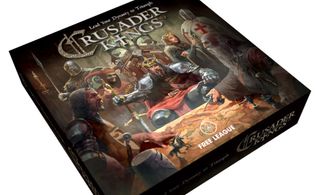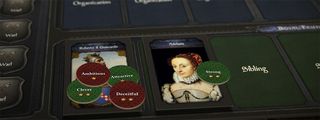The Crusader Kings board game brings the medieval soap opera to your tabletop
Hands-on time with the upcoming Crusader Kings tabletop game showcases its unique mechanics and digital legacy.

Crusader Kings, everyone’s favorite medieval dating, plague, and war simulator, is coming to the tabletop. This past weekend at PDXCon in Stockholm, as Paradox announced their suite of licensed board games, I had a chance to sit down with a few of the game’s designers from Free League publishing and play some rounds of Crusader Kings. It’s a narrative-focused strategic game that stays very close to the roots of the franchise as, in the publisher’s own words, a “medieval strategy soap opera.” Tomas Härenstram, leader of the game’s design team at Free League, used to work on the Crusader Kings team at Paradox and emphasized his love for the game. The design process for the game started last year with a wide range of designs and culminated this year in the current Kickstarter.
If you’re not familiar with reading previews of board games, know that mechanics can change significantly between a preview and a game’s publish date. Though Crusader Kings was in a very finished state small details were still up in the air, as were some major things like precisely how many victory points were awarded for various game goals.

Each player takes on the role of a dynasty ruling large swathes of the medieval world. Norman British, German, French, Italian, and Spanish dynasties were all in the game, though which appeared was based on player count and scenario chosen. To win, players conquer territory from each other, expand their family line, build their kingdom, and send family members on crusades. The most interesting mechanic in the game is definitely its resolution system—used for everything from military conquest to wooing spouses. It’s based on your family’s overall behavioral traits, something very familiar to players of the PC game.
Every character that pops up in the game is given a random trait. Either positive or negative, these are things like Cruel, Pious, Kind, or Lustful. As rulers lead their lives or come into power, these traits are added to a bag, and when you need to resolve something traits are drawn from the bag. A positive trait is a success, negative a failure. Some traits are critical to a task and give you benefits if drawn—Cruel is a negative trait, but when drawn in war or crusading, it’s a success. This means that like in the video game, constructing your dynasty out of the most ideal members is key to success. A few too many imbeciles on the throne means you’re saddled with bad odds of success for the whole game, but marrying them to Clever and Strong spouses will balance the bad blood out. Of course, money solves lots of problems, and money could always be spent to get extra draws from the bag.

Like the video game, much of Crusader Kings was about diplomacy, bartering, and alliances. Nearly anything in the game was up for trade, so you could easily do something like trade your court doctor to another ruler for a favorable marriage or pay a rival to assassinate your Imbecile child and prevent him from inheriting the throne. That said, there were key limits on diplomacy. You have to have a casus belli to declare war against other players, and once started a war is hard to stop. Marrying your children into other dynasties also gave you a pact with them, meaning you could support each other in wars against a third party.
Each generation of the game you draw a number of cards, each corresponding to an action type like Crusade, Tax, Build, Plot, or Levy. Those cards are then played, two at a time, in a series of rounds. Each action type lets you do a few things within a specific framework—Levy cards, for example, let you either raise new troops or direct existing troops in attacks. Cards also have an event on them, something like a plague in your lands or a child for your opponent’s dynasty. Picking your action for the turn is as much about your own strategy as trying to avoid bad events or not hand advantages to your opponents.

It’s very much the kind of story engine that fans of Crusader Kings on PC will enjoy.
Much of the game is tied up in these events, and what strategies you have available is often up to events played by your opponent over which you have no control. Children, for example, come entirely from these cards. This is very much the way in which Crusader Kings is not a traditional area control wargame—those who want a symmetrically balance tactical experience might not enjoy the heavily narrative way that these events skew the game.
The biggest gaming news, reviews and hardware deals
Keep up to date with the most important stories and the best deals, as picked by the PC Gamer team.
That said, it’s very much the kind of story engine that fans of Crusader Kings on PC will enjoy. In just a handful of plays of the game I’d seen the kinds of stories that you play dozens of hours of the PC game for. I saw a king of England assassinated and married off three awful daughters to make room for a useful heir in my crowded house. Another player repeatedly sent off his Imbecile son to die in the crusades, only to see the son flourish and succeed time and time again.
Overall, Crusader Kings felt like a game that was true to the PC legacy while shedding the more onerous simulation of a grand strategy experience for a sleeker form. Unlike similar tabletop games such as Fief or Warlords of Europe, it’s more about a strong narrative and less about chucking handfuls of dice. Crusader Kings is on Kickstarter now from Free League publishing. It’s due to ship to backers in late 2018 before a broader retail release in early 2019.
Jon Bolding is a games writer and critic with an extensive background in strategy games. When he's not on his PC, he can be found playing every tabletop game under the sun.

If you love big trucks, establishing trade routes, and the phrase 'post-apocalyptic survival business simulator' then I've got just the strategy RPG for you

Blizzard veteran David Kim's strategy comeback with Battle Aces is 'very personal:' 'I just can't accept... the end-all peak of RTS is StarCraft 2 and nothing can ever be better'
Most Popular


